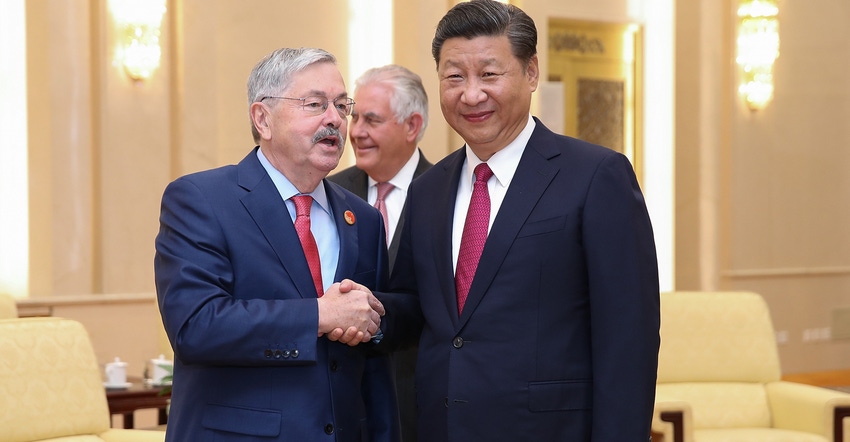
Terry Branstad holds the record — 22 years, four months and 13 days — as the longest-serving governor in U.S. history, serving from 1983 to 1999 and again from 2011 to 2017 as Iowa’s governor.
But from 2017 to 2020, Branstad was the U.S. ambassador to China during the Trump administration. He was serving as ambassador in China during the COVID-19 outbreak and was an eyewitness to the challenges of operating in the country during those times.
At Nebraska Gov. Pete Ricketts’ recent Summit on Agriculture and Economic Development in Kearney, Neb., Ricketts interviewed Branstad for attendees at the summit, as well as through a Facebook Live event.
Branstad told the audience that initially he was a little skeptical of the strategy of adding tariffs on Chinese goods as a way to influence the Chinese to level the playing field with the U.S. “But that got their attention,” Branstad said.
President Donald Trump said we’re not going to have these endless dialogues that lead to nowhere, Branstad explained. “They kept putting it off and making excuses,” he said. “But they are the second-biggest economy in the world.” The U.S. began to insist on fairness and reciprocity in all areas, especially in trade, Branstad added.
Trade issues
Branstad admitted that there were challenging and difficult times as China retaliated for those tariffs. “But once we got through that and signed the trade agreement, it has made a big difference,” the former ambassador said.
He cited better commodity prices in recent months, thanks in part to China fulfilling grain and commodity purchases secured in Phase 1 of a new trade agreement with the country. While China hasn’t fully complied with the trade promises for a variety of reasons, good progress has been made, Branstad said.
Although Branstad said it is too early to tell if the Biden administration will continue on the same course, he expressed hope that it would continue to enforce the current trade agreement and extend it.
Branstad has a long-standing relationship with Chinese President Xi Jinping. While Branstad was Iowa’s governor in 1985, Xi, who was then a young official from the Hebei Province, led an agricultural delegation to Iowa.
Branstad said that they toured many agricultural sites while Xi and his delegation were in Iowa. This earlier relationship helped Branstad as U.S. ambassador to have a better understanding of Xi and China’s policies in general.
China needs U.S. products
“The Chinese people themselves, in my opinion, are very good. They are very hardworking. They are family-oriented,” Branstad observed. “But they are saddled with a terrible, one-party, authoritarian, Communist system.”
He noted that China has a real need for American goods. “China is a huge country with a huge population, but they don’t have productive land. They have some, but not like what we have in the U.S.,” Branstad said. “They’ve had weather issues. The Chinese people appreciate the safety, quality and reliability of American food.”
He cited new openings for U.S. exports to China of ethanol, beef and other products.
“I’m glad that I went,” Branstad said of his time as U.S. ambassador. “I knew it would be difficult and challenging, and we tried to do everything we could while we were there. COVID broke out, so there was a lot we had to do because of that. I’m really proud of the team we had there.”
Ricketts and Branstad also discussed the COVID-19 outbreak, and U.S.-China relations on a broad range of topics.
The summit in Kearney offered breakout sessions on a variety of topics, including growing Nebraska’s exports and building broadband across the state. The event was co-hosted by the Nebraska Department of Economic Development and the Nebraska Department of Agriculture.
View the entire Branstad interview at facebook.com.
About the Author(s)
You May Also Like






